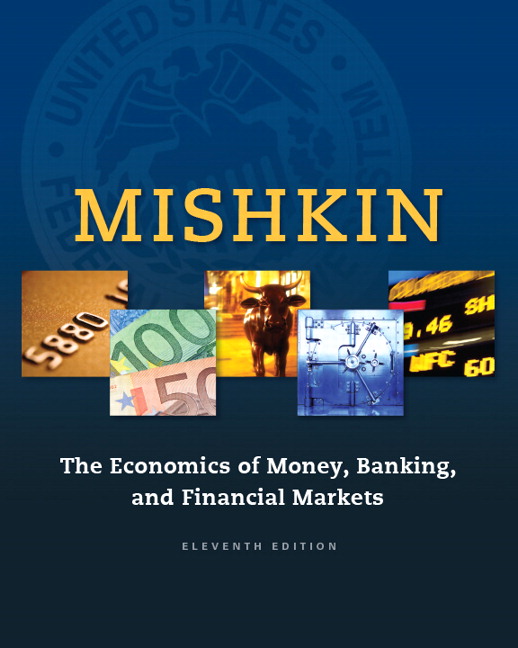Test Bank For The Economics of Money, Banking 11th edition by Mishkin
Digital item No Waiting Time Instant DownloadISBN-13: 978-0133836790 ISBN-10: 0133836797
In Stock
Original price was: $65.00.$20.00Current price is: $20.00.
Test Bank For The Economics of Money, Banking 11th edition by Mishkin
able of Contents
PART 1. INTRODUCTION1. Why Study Money, Banking, and Financial Markets?2. An Overview of the Financial System3. What Is Money?
PART 2. FINANCIAL MARKETS4. Understanding Interest Rates5. The Behavior of Interest Rates6. The Risk and Term Structure of Interest Rates7. The Stock Market, the Theory of Rational Expectations, and the Efficient Market HypothesisPART 3. FINANCIAL INSTITUTIONS8. An Economic Analysis of Financial Structure9. Banking and the Management of Financial Institutions10. Economic Analysis of Financial Regulation11. Banking Industry: Structure and Competition12. Financial CrisesPART 4. CENTRAL BANKING AND THE CONDUCT OF MONETARY POLICY13. Central Banks and the Federal Reserve System14. The Money Supply Process15. The Tools of Monetary Policy16. The Conduct of Monetary Policy: Strategy and TacticsPART 5. INTERNATIONAL FINANCE AND MONETARY POLICY17. The Foreign Exchange Market18. The International Financial SystemPART 6. MONETARY THEORY19. Quantity Theory, Inflation, and the Demand for Money20. The IS Curve21. The Monetary Policy and Aggregate Demand Curves22. Aggregate Demand and Supply Analysis23. Monetary Policy Theory24. The Role of Expectations in Monetary Policy25. Transmission Mechanisms of Monetary PolicyCHAPTERS ON THE WEB26. Financial Crjses in Emerging Market Economies27. The ISLM Model28. Nonbank Finance29. Financial Derivatives30. Conflicts of Interest in the Financial Services Industry
Test Bank for “The Economy of Nature,” 6th Edition by Ricklefs
Overview: The Economy of Nature, 6th Edition by Robert Ricklefs is a foundational textbook in ecology that explores the principles of ecological systems and the interactions between organisms and their environments. The test bank for this edition is designed to support educators and students by providing a comprehensive set of assessment tools that cover the fundamental concepts and applications of ecological science.
Content Details:
- Introduction to Ecology:
- Basic Ecological Concepts: Introduction to key concepts such as ecosystems, biomes, and ecological hierarchies.
- Ecological Methods: Overview of methods and techniques used in ecological research, including field studies and laboratory experiments.
- Population Ecology:
- Population Dynamics: Examination of population growth models, including exponential and logistic growth.
- Population Interactions: Study of interactions within populations, including competition, predation, and symbiosis.
- Community Ecology:
- Species Interactions: Analysis of community interactions such as predation, competition, mutualism, and parasitism.
- Community Structure and Diversity: Exploration of factors influencing community structure, species diversity, and succession.
- Ecosystem Ecology:
- Energy Flow: Examination of energy flow through ecosystems, including primary production and trophic dynamics.
- Nutrient Cycling: Study of biogeochemical cycles, including the carbon, nitrogen, and phosphorus cycles.
- Global Ecology:
- Biomes and Climate: Analysis of global biomes and the impact of climate on ecological patterns.
- Global Change: Discussion of anthropogenic effects on global ecosystems, including climate change, habitat destruction, and pollution.
- Population Genetics and Evolution:
- Genetic Variation: Examination of genetic variation within populations and its impact on evolution.
- Evolutionary Processes: Study of natural selection, genetic drift, gene flow, and evolutionary adaptations.
- Human Impact and Conservation:
- Conservation Ecology: Overview of conservation principles, strategies for preserving biodiversity, and managing endangered species.
- Human Activities: Analysis of the effects of human activities on ecosystems, including land use changes, resource exploitation, and environmental policies.
Interactive Features of the Test Bank:
- Multiple-Choice Questions: Assess understanding of key ecological concepts and their applications.
- True/False Questions: Test basic knowledge and definitions of ecological terms and theories.
- Short Answer Questions: Encourage detailed explanations and application of ecological principles to various scenarios.
- Problem-Solving Questions: Provide case studies and problems related to ecological research and management.
- Essay Questions: Facilitate in-depth analysis of complex ecological issues and theoretical concepts.
Conclusion: The test bank for The Economy of Nature, 6th Edition by Robert Ricklefs is a valuable resource for educators and students in the field of ecology. It offers a broad range of questions designed to assess and enhance comprehension of ecological concepts, interactions, and real-world applications. By providing diverse assessment tools, this test bank supports effective teaching and learning in understanding the dynamic relationships within ecosystems and the impact of human activities on the environment


Reviews
There are no reviews yet.